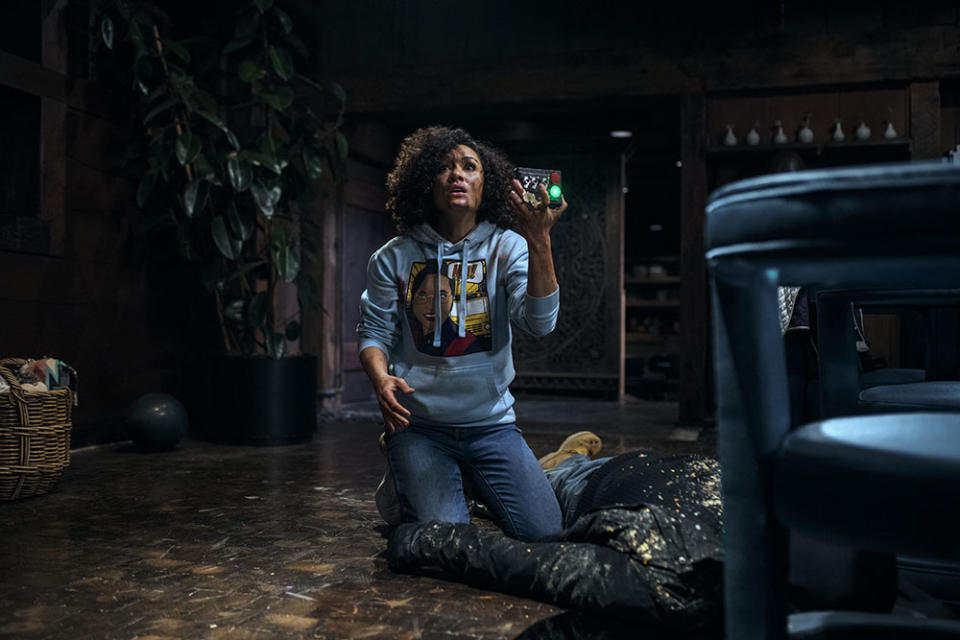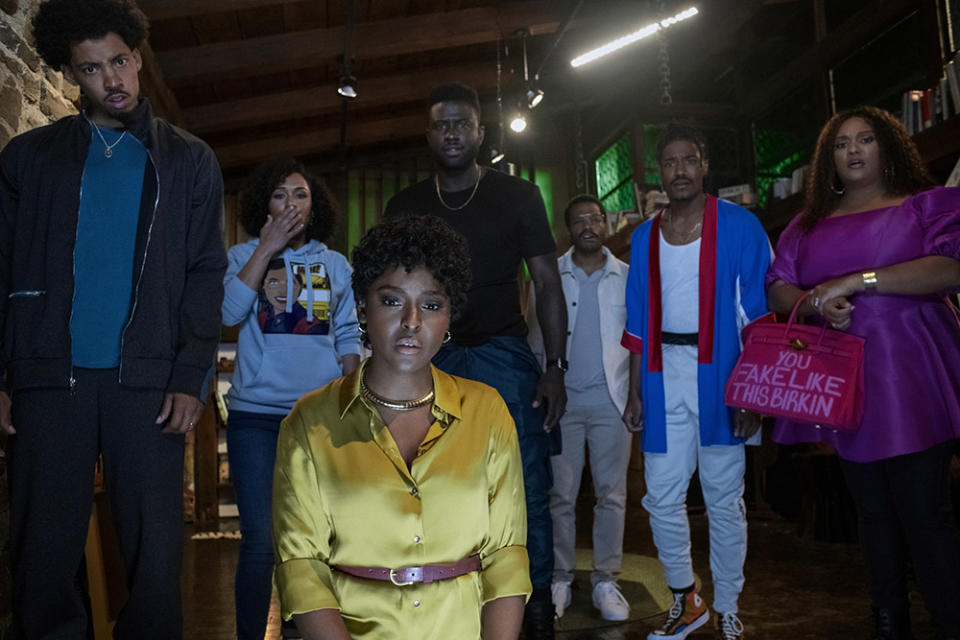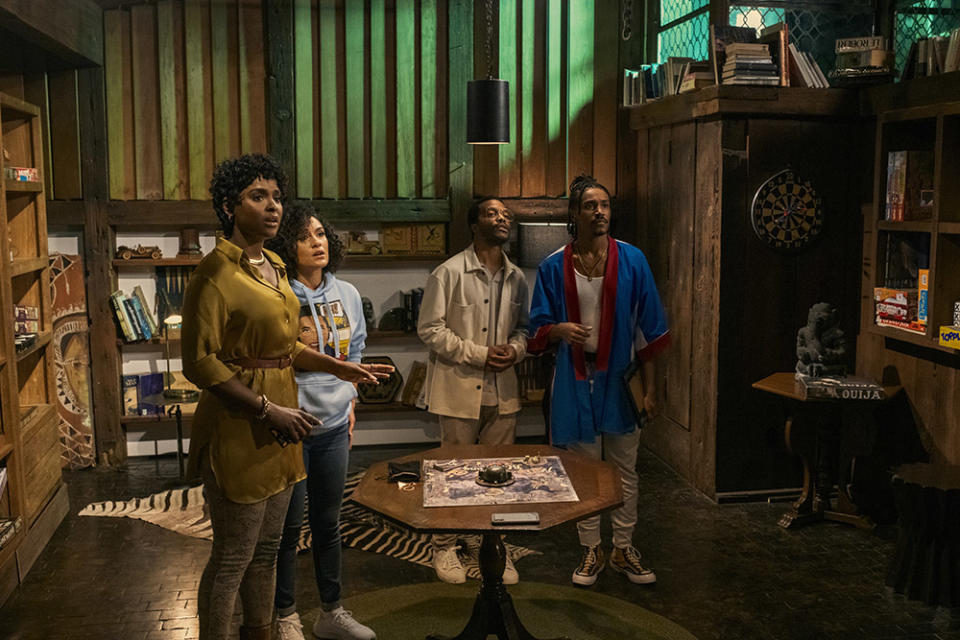‘The Blackening’ Star Grace Byers on Tackling the Horror Genre’s Most Careless Tropes
- Oops!Something went wrong.Please try again later.

The Blackening star Grace Byers didn’t just take on the tired trope of Black characters dying prematurely in horror movies. Her no-nonsense character, Allison, also challenged the idea that Blackness can be measured.
The Tim Story-directed horror-comedy revolves around a group of college friends who reunite for some fun at a remote cabin, but things quickly go awry when they become the target of a masked killer and his menacing board game, The Blackening. Eventually, Byers’ character suggests that the group split up, and this approach is yet another horror trope that rarely works out well for everyone. Recognizing this pattern, the college friends immediately criticize Allison’s judgment, attributing it to the white side of her biracial identity. (The friend group ultimately heeded Allison’s advice.)
More from The Hollywood Reporter
The Pennsylvania-born, Cayman Islands-raised Byers is also biracial, so she understands exactly what her character is going through when her identity is constantly called into question.
“I love Allison’s response in that moment where she says, ‘This isn’t my white side talking. This is me talking as a whole Black person, who just so happens to be biracial,’” Byers tells The Hollywood Reporter. “So I think that that’s reflective of the entire spectrum of the Black diaspora. There are many different types of Black, and trying to define that or quantify that will always leave someone in a futile position.”
Below, during a recent conversation with THR, Byers, who’s also a New York Times best-selling author, explains why she opted not to lean into the predominantly comedic tone of The Blackening during the casting process.
So The Blackening tackles the age-old trope that Black characters are the first to die in horror movies. Did this pattern create a barrier between you and being a fan of the genre?
I am an empath, and so that was the barrier between me and the genre. (Laughs.) I have a hesitation for watching some horror films because I just take on everything in the genre. But I will say that if there had been more Black people in the genre, I might have braved it a little bit more. (Laughs.)

Whether it’s a horror movie or something else, do you remember the first time where you recognized just how different Black characters are treated on-screen?
Absolutely. As a child, there were lots of television shows and films that I loved, but they did not have a lot of, or any, Black representation. And I remember thinking, “That’s not the world that I live in and that doesn’t look like the totality of the people that I see. Why don’t I see more people of color in general?” And so I definitely saw that from a very young age.
You already worked with the co-writer, Tracy Oliver, on your TV series, Harlem, but how did your casting play out?
I auditioned for [director] Tim Story on Zoom. We were still in the midst of the pandemic, and that was a lot of fun, even though it was clearly a horror-comedy. So there were a lot of comedic aspects, but I wanted my take on Allison to remain very grounded. I didn’t want to play the comedy; I wanted to bring truth to her. And so I thought to myself, “They’re either going to want the grounded take, or it’s not going to be what they wanted and I won’t get it. And that’s okay.” But that was the take that I decided to go with, and Tim said that it was exactly what he was looking for, so I was really happy about that.
Degrees of Blackness is a big topic of conversation in the film, and the group gives your character a hard time because she’s biracial. For example, when Allison suggests that everybody should split up, they chalked that decision up to her white side. Of course, everything is heightened in this movie, but as a biracial woman yourself, can you relate to Allison’s feeling of constantly having to prove herself?
Absolutely. In my conversations with many, many Black people, I have found that we have all had our Blackness accosted, questioned and put into some type of definition that we felt unseen by, in a way. If you talk to any Black person, really, you will hear them say, “Yeah, there was a time where someone questioned my Blackness as well. They said I wasn’t Black enough because of X, Y, or Z.” And I love Allison’s response in that moment where she says, “This isn’t my white side talking. This is me talking as a whole Black person, who just so happens to be biracial.” So I think that that’s reflective of the entire spectrum of the Black diaspora. There are many different types of Black, and trying to define that or quantify that will always leave someone in a futile position.

You grew up in the Cayman Islands, and then you came back to the States for higher education. Was there less focus on your identity in the Cayman Islands when compared to your early experiences in America?
Colorism and the conversation of Blackness is worldwide. It’s a global discussion, I believe, and although there are differences in culture as far as America, the Caribbean, Africa and different parts of the world, you still see prejudices everywhere. You see discrimination everywhere. Socioeconomic statuses reflect that everywhere, and although certain experiences are slightly different, there is a unification of Black people worldwide when it comes to this.
You got to have a Black Panther-type moment in the woods, as Allison has a fun fight scene with the killer. Was being on the offensive a nice change of pace after running from harm the whole movie?
It was a lot of fun, and we all had stunt doubles to aid us in those processes. So I was really excited about being able to work with my stunt double, but I was like, “Can I please do the stunt choreography?” And so they let me do it. Now, my stunt double looked a lot like me, so I don’t know which parts were me and which parts were her, but listen, I feel very well represented by her. (Laughs.) We did a heck of a job out there, and we had a lot of fun doing it.
You’ve shot a ton of TV the last decade, and that process is very fast. You have eight days to create 44 minutes of television, give or take. So, to go from that pace to the pace of a feature film, could you feel a noticeable difference?
For this film, since there was a lot of adrenaline, it did feel a little fast paced as well. The majority of the film we’re all running for our lives, and so that felt on the quick side. So I will say that I didn’t feel so much of a huge difference. We shot this project in five-and-a-half, six weeks, and so it was pretty on par to how it is in the television world.

When you read the script for the first time, how well did you do on the Blackening questions?
I did pretty well. We were all joking and going, “Do we know the answers to this?” And a lot of us really did know the majority of the answers, which was really impressive. (Laughs.)
So, the First AD [Ian J. Putnam] read the Blackening voice out of frame. Did he also do your voices whenever the characters would communicate telepathically?
I don’t remember if it was an AD or Tim, but I think it was Tim who actually read our voices. We then did the ADR later.
I asked Antoinette Robertson this question as well, but a decade from now, when you and your castmates reunite at a remote cabin to celebrate the anniversary of this movie, what day on set will you likely remind everybody of first?
(Laughs.) Maybe our first day on set. It was really wonderful gathering with everybody for the first time, and we didn’t really know each other. I think Dewayne [Perkins] and X [Mayo] knew each other ahead of time, but the rest of us didn’t really know each other, and so we just bonded so quickly and so effortlessly. It was really wonderful to see that natural camaraderie come through from the very first day, and I’m hoping that it feels and looks organic on screen, because it definitely was. So that was a gift, and it’s a really rare gift.
***
The Blackening is now playing in movie theaters. This interview was edited for length and clarity.
Best of The Hollywood Reporter
Natalie Portman at Cannes: "I Need to Leave the Drama for the Screen"
Ailing ‘Superman’ Star Valerie Perrine Finally Finds Her Hero: "The Guy Should Be Sainted"

